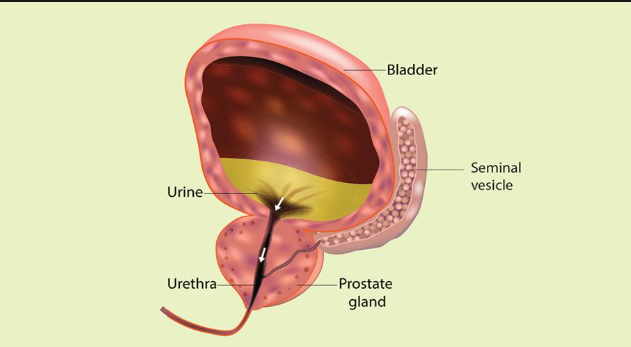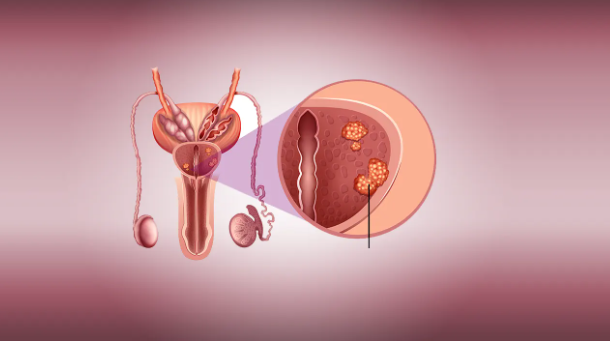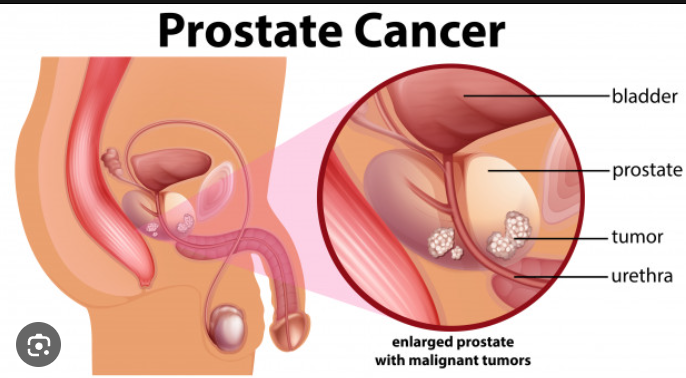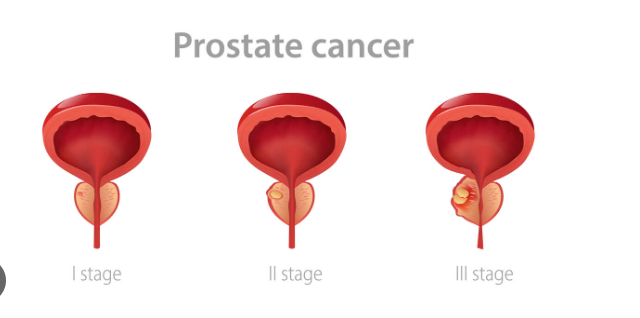Know the basics of symptoms, diagnosis, and treatment to help you battle prostate cancer
According to estimates from the American Cancer Society, almost 175,000 men in the United States will receive a prostate cancer diagnosis in 2019. In his lifetime, 1 in 9 people will receive a diagnosis, and 1 in 41 will pass away from the illness. This means that, after skin cancer, prostate cancer is the most common cancer in American men and the second leading cause of cancer-related death.
Prostate cancer is curable, and for many men, the cancer grows slowly enough that treatment is not necessary to ensure a full and healthy life.
Also read-Unveiling The Culprits: 5 Foods That Can Damage Your Intestine

Signs and symptoms prostate cancer
It is nearly impossible to “feel” as though you may have it because the tumor usually grows without causing any noticeable changes, pain, or discomfort. Instead, after being screened, the majority of men learn they might have the illness.

However, advanced stages of the illness may spread to neighboring tissues, resulting in the signs and symptoms of it, such as:
- Urinating frequently and/or urgently
- Urinating excessively
- unpleasant urination
- erotic dysfunction
- ejaculation that hurts
- Reduced production of semen during ejaculation
- Blood in the semen or urine
- Pressure or pain in the rectal area
Consult a physician if you encounter any of these cautionary indicators. You most likely do not have it, but regardless of the cause, urinary, rectal, and sexual issues should never be disregarded.
Causes
The precise cause of prostate cancer is unknown. It’s probably a result of a mix of genetic and environmental factors, like many diseases. For example, hereditary genetic mutations in the BRCA1 and BRCA2 genes have been associated with a higher risk of prostate cancer, among other cancers. “A lot of it comes down to genetic mutations that people inherit from their parents,” says Liaw. However, the Prostate Cancer Foundation reports that no more than 10% of cases of prostate cancer appear to be directly related to inherited genetic mutations. Put differently, most men who develop prostate cancer do not have a family history of the disease, according to the ACS.

One thing that’s definitely not a cause of prostate cancer? A lack of sexual activity. In general, prostate cancer develops when a normal prostate cell starts to grow abnormally—something that has nothing to do with your sexual life. And while some sexually transmitted diseases are being studied for their connection to cancer, no conclusions have been reached.
Prevention
Until researchers know more about the disease’s causes, doctors won’t be able to “prescribe” any surefire ways to prevent prostate cancer. However, doing what you can to support good health overall may help. For instance, eating fewer animal products (especially red meat and high-fat dairy) and more fruits and vegetables seems to be associated with a slightly lower risk of prostate cancer, according to the American Cancer Society.

“We don’t really have a lot of fantastic strategies for preventing prostate cancer—that’s a little bit because we can’t isolate any inciting event for why cancer comes about,” Liaw says. “And this isn’t just prostate cancer; it’s hard to pinpoint exactly where any cancer comes from.”
Risk factors
Although the precise causes of prostate cancer are unknown, researchers do know that certain populations have a higher risk of developing the disease. The following factors may increase your risk of prostate cancer:

- Are you 65 years of age or older?
- Possess a sibling or father who has prostate cancer
- Possess several relatives with a history of prostate cancer, particularly if the disease was discovered early in life
- Possess a family history of cancer, such as pancreatic, ovarian, or breast cancer
- Possess African or Caribbean heritage
- Possess Lynch syndrome, a disorder brought on by inherited gene alterations.
Screening and diagnosis
The decision to start screening for prostate cancer, when to start, and how often to do so is mostly a personal one that should be discussed with your doctor on an ongoing basis, taking into account your individual risk factors and awareness of the benefits and drawbacks of screenings.

The U.S. Preventive Services Task Force advises men between the ages of 55 and 69 to discuss the benefits and drawbacks of screening based on their individual risk factors with their doctors and determine when and if they should ever get the screening. The task force advises against screening men 70 years of age and older because, at that point, the risks associated with screening (such as the need for further, unnecessary treatments) usually outweigh the advantages.
If you have risk factors for prostate cancer, however, don’t wait until you’re 55 to have a discussion about screening with your doctor. Per the American Cancer Society, such conversations should begin at age 45 if you’re at high risk (for African American men and those with a first-degree relative, such as a father, brother, or son who was diagnosed with the disease before 65) and at age 40 for men with higher risk (men with multiple first-degree relatives who had prostate cancer at a young age). The ACS suggests that even men with “average risk” should discuss screening at age 50.
Treatment
Three main approaches are usually used to treat prostate cancer: radiation, surgery, or watchful waiting. “The big question is: to treat or not to treat?” According to Dr. Philip Kantoff, the chair of the medical department at Memorial Sloan Kettering Cancer Center in New York City, he is a medical oncologist and researcher on prostate cancer. Men may choose to just have their doctors monitor their prostate cancer because it can grow very slowly. This is especially true if they are older than 60, as they may die from natural causes rather than complications related to their prostate cancer.

Usually, men who choose to treat the disease will have the option of radiation therapy or surgery, or occasionally a combination of the two. The decision usually boils down to provider preference and personal preference (do you detest the idea of prolonging a treatment regimen or doing surgery?). There are no clinical trials comparing their ability to prevent the spread of cancer, and neither is obviously “better” than the other. “It depends on the patient’s interpretation of side effects; it depends on who the patient sees; it depends on the advice they get,” Kantoff stated.
Also read-Pancreatic Cancer : A Patient’s Guide to Pancreatic Cancer And Symptoms
images source: Google
Disclaimer: The opinions and suggestions expressed in this article are solely those of the individual analysts. These are not the opinions of HNN. For more, please consult with your doctor.




































